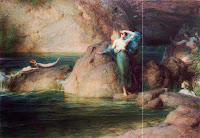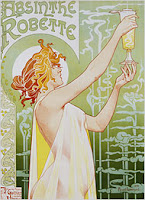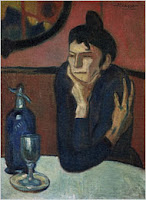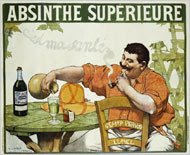Friday, November 30, 2007
Thursday, November 29, 2007
Halcyon
From the Oxford English Dictionary:
1390 GOWER Conf. II. 106 (Bodl. MS. 294) Hir briddes it..Of Alceon e name bere. 1398 TREVISA Barth. De P.R. XIX. lxxix. (1495) 910 In the cliffe of a ponde of Occean, Alicion, a see foule, in wynter maketh her neste and layeth egges in vii dayes and sittyth on brood..seuen dayes. 1545 JOYE Exp. Dan. Ep. Ded. (R.), Thei saye, that in the..coldest tyme of the yere, these halcions (making their nestis in the sea rockis or sandis) wille sitte their egges and hatche forth their chickens. c1592 MARLOWE Jew of Malta I. i, How stands the wind? Into what corner peers my halcyon's bill? a1631 DRAYTON Noah's Flood (R.), There came the halcyon, whom the sea obeys, When she her nest upon the water lays. c1750 SHENSTONE Elegies v. 22 So smiles the surface of the treach'rous main As o'er its waves the peaceful halcyons play. 1819 J. H. WIFFEN Aonian Hours (1820) 104 The brilliant halcyons..fluttering upon azure wings, appear Loveliest above secluded waters. 1867 Contemp. Rev. VI. 252 The alcyon sits her floating nest.
fig. a1649 DRUMMOND OF HAWTHORNDEN Poems Wks. (1711) 39/1 Makes Scotland's name to fly On halcyons wings..Beyond the ocean to Columbus shores. 1880 GOLDW. SMITH in Atlantic Monthly No. 268. 200 The halcyons of literature, art, and science were floating on the calm and sunlit sea.
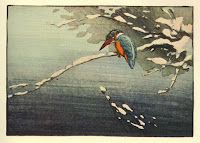 My favorite is Alan Paton's use of "halcyon days" in Kontakion For You Departed, a memoir upon the death of his wife: "The halcyon days. I write of them with unbelievable longing to have again what one cannot have again, so that my desire to relive what cannot be relived begins actually to war against my knowledge, final and ineluctable, that it cannot be done. ... The halcyon days. And that means not only the sweetest days of life, it means also the days that cannot be lived again, except in memory."
My favorite is Alan Paton's use of "halcyon days" in Kontakion For You Departed, a memoir upon the death of his wife: "The halcyon days. I write of them with unbelievable longing to have again what one cannot have again, so that my desire to relive what cannot be relived begins actually to war against my knowledge, final and ineluctable, that it cannot be done. ... The halcyon days. And that means not only the sweetest days of life, it means also the days that cannot be lived again, except in memory."The idea of a time of peace in the winter for the birth of a baby is strangely reminiscent of the birth of Christ and even of the Pax Romana (okay, I don't know if Christ was born in the winter).
Rudolph the Recycled Reindeer

Quality Mnemonic
I want to have 8 children by the time I'm 37, but for this to happen, my husband will need a [good!] 401K. 4 plus 1 equals 5, and hopefully by the time I'm 73 (the reverse of 37), I'll be done having children.
This is priceless because it repeatedly cracks me up, plus I don't think I'll ever be able to forget this number. What a friend, Jack!
Wednesday, November 28, 2007
Demanovka
Besides Benedictine, this is the most wonderful drink. And it greatly increases one's ability to pronounce Slovak words. In fact, with Demanovka, I was able to pronounce even Slovak tongue twisters correctly.
To the Calvinists, Who, Like Gnostics, Think that God is Evil

Unde Malum
Where does evil come from?
Alas, dear Tadeusz,
Czeslaw Milosz
Man is evil and depraved; therefore, God must be, too.
Tuesday, November 27, 2007
Too Late the Phalarope

Saturday, November 24, 2007
Weddinging
"7:00 Toasts
7:05 First dance
8:00 Toss bouquet
8:15 Last dance
8:20 Pass out rose petals
8:20 Goodbye shots"
on a wedding schedule, I didn't think "photographer"; I thought, "Wow. 'Goodbye shots.' That's a cool idea. Everyone does shots to honor of the beginning of the marriage. I'm down with that." Alas. Sadly mistaken.
Tuesday, November 20, 2007
Rant, Notably Not about Men, Or On Manicures
Bells and Pomegranates
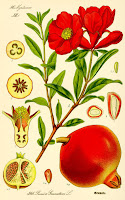

Mary holding a pomegranate reminds me of some lines from Ash-Wednesday: "The desert in the garden the garden in the desert / Of drouth, spitting from the mouth the withered apple-seed." I'm convinced (wrongly?) that these lines, at least at one level, refer to Mary (the Lady of Silences) and her act of bearing Christ, who Eliot also refers to as the silent Word. The pomegranate is an interesting fruit because it is comprised of many little fruits, each surrounding a rather predominant seed. These fruits are held together in one.
Anne of the World

 Japanese people, of all people, are evidently particularly enthralled by Anne of Green Gables (and have been since World War 2). As someone who is enthralled by Anne myself, I'm intrigued by their intrigue.
Japanese people, of all people, are evidently particularly enthralled by Anne of Green Gables (and have been since World War 2). As someone who is enthralled by Anne myself, I'm intrigued by their intrigue.
I see three points of resonance between Anne of Green Gables and traditional Japanese culture. The first one is the prominence of natural imagery in Anne of Green Gables. Every chapter begins with an evocation of the seasonal setting for the events in the narrative. This accords perfectly with the practices of classical Japanese literature. For example, the Tale of Genji, a work written by a woman around 1008 AD that has been canonized as the foundation of the Japanese literary tradition, builds every chapter around seasonal imagery in a way quite similar to Anne of Green Gables. [...]A second factor for the easy acceptance of Anne of Green Gables by Japanese readers might be that Anne's character accords with the Japanese conception of a child's mind and character. Traditionally children were assumed to have magokoro, "sincerity of heart." Anne's purity of heart maintained despite the trauma and abuse she suffered as an orphan is in harmony with this conception.
The third aspect of Anne of Green Gables that resonates with Japanese culture is Anne's high moral standard in relinquishing of her scholarship at the end of the book to assist Marilla after Matthew's death. Her decision can be considered an act of filial piety, made all the more poignant because she is an adopted child. Adoption was common within the large multi-family networks of traditional Japan. To sacrifice an opportunity of one's own to take care of a parent rings true with all that is considered noble in traditional Japanese morality, and while an adopted child was expected to abide by the same code as birth children, there was a recognition that full and willing compliance with that code by an adopted child was a touching expression of moral character.
Sunday, November 18, 2007
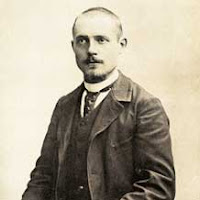
When we sit down at the cross formed by two ways
You alone, mistress of the secret, attest
And not through virtue, which we don’t possess.
And to approach the axis of distress,
Through that sleight-of-hand, that very artfulness,
Charles Peguy
Wikipedia delightfully calls Peguy a "devout but non-practicing Roman Catholic," which is actually a really sad bit--he never joined the Church as a result of family circumstances, but did adopt other many Catholic beliefs. This was part of the tension that he struggled with and felt deeply. There are obviously many elements of the dark night of the soul in this poem.
And a bit more:
Heureux ceux qui sont morts pour la terre charnelle;
mais pourvu que ce fût dans une juste guerre.
Heureux ceux qui sont morts dans les grandes batailles,
couchés dessus le sol à la face de Dieu
[..]Heureux les épis murs et les blés moissonnés... (for Ilana)
Tuesday, November 13, 2007
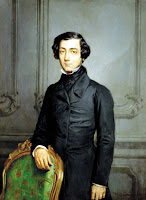
This worries me for several reasons: 1) It resonates with my own experience--it is easy to make many friends, but more difficult to properly serve them; 2) The question of caring for the elderly is relevant here. Not only are many children choosing not to care for their ageing parents in their own home, but many parents are refusing to let their children care for them as they age. We esteem a false and unsustainable independence that forces us to reject our condition of dependence. We deprive others of the privilege of serving and grandchildren of the seeing the responsibilities that family carries.
On the Elevation of the Eucharist
John 3:14 "And as Moses lifted up the serpent in the wilderness, even so must the Son of man be lifted up"
A striking aspect of the snake story is that it is a snake that is lifted up on a pole to cure the men of snake bites. This parallels the need for the Incarnation.
Additionally, the difference between the Ascension and the Assumption is interesting and vaguely related. With the ascension that locus of action is in the person ascending. Christ is elevating Himself. Assumption, on the other hand, implies being acted upon. Mary was the first to be assumed--Christ elevated her in an elevation that we, too, can hope for.
Eliot the Agrarian (Or, Eliot with Tobacco)

Monday, November 12, 2007
Sunday, November 11, 2007
Guestblog: My Penetrating Insights into the Mysteries of Life
I was searching for your Facebook.com site and couldn't find it. This could only be for a few reasons:
1) [deleted]
2) You were being stalked by a Facebook.com-lover
3) You were caught stalking someone else
4) You decided to focus all your "energies" on the blog that I still don't know about
5) Your roommate told you that you can only have a facebook.com site on the even-numbered months
6) Your computer broke and since you couldn't see your profile every 15 min., you asked your sister to delete your site because it wasn't going to be worth it if you couldn't be properly addicted
7) You added the "smell-application" and couldn't get your computer to stop smelling like your friends (needless to say, your friends don't shower "all that much")
8) Your roommate deleted your site
9) You decided that it didn't aesthetically accord with your cigarette holder (I mean, really, who could simultaneously have a cigarette holder and a Facebook.com site... Would Audrey Hepburn have a Facebook.com site?)
10) Your priest told you that it was in accordance with Vatican II, but that still didn't mean it was good for your health (according to the latest social studies released by the Vatican Council's document "Things that cannot Properly be Studied " (TPS reports)
11) Hegel would have had one
12) Kant thought it disobeyed the categorical imperative
13) TS Eliot thought it was narcissistic
14) TS Eliot was narcissistic
15) You were thinking about Camus' saying, "the most important question in philosophy is whether or not to commit suicide," answered in the negative, and decided to put this in the so-called 'concrete' realm by deleting your Facebook.com site
16) You were thinking about the second-half to Camus's saying (i.e., the most important question in political philosophy is whether or not to get out of bed) and decided that the next best thing was to delete your Facebook.com site
17) TS Eliot rejected you as a friend
18) You didn't think the form matched the content. I mean, how could your life be adequately expressed in such a medium?
19) Your sister told you that it was "gay" to have one at Oxford
20) You wanted to have only those so-called "artificial" friends that you can "contract" at the mall. You now no-longer speak to anyone except those whom you have met at the mall. Plus, you were worried about the pending difficulties when Facebook.com releases its latest application, "Mall Friends," and decided the only non-contradictory way out was to simply delete it.
If I were a bettin' man, I would put money on 1, 6, 9, 11, 17, and 20.
Saturday, November 10, 2007
A Sympathetic Devil
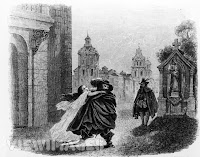
Tuesday, November 6, 2007
Duchess-Nun
Monday, November 5, 2007
Newspaper Ethics


Kayne West, Stronger
Work it harder make it better,
do it faster makes us stronger,
more than ever, hour after
hour work is never over
Th-th-that that don't kill me
Can only make me stronger
I need you to hurry up now
Cause I can't wait much longer
I know I got to be right now
Cause I can't get much wronger
Man I been waitin' all night now
That's how long I've been on ya
Richard Lovelace, To Lucasta, On Going to the Wars
Tell me not, sweet, I am unkind,
That from the nunnery
Of thy chaste breast and quiet mind
To war and arms I fly.
True, a new mistress now I chase,
The first foe in the field;
And with a stronger faith embrace
A sword, a horse, a shield.
Yet this inconstancy is such
As you too shall adore:
I could not love thee, dear, so much
Lov'd I not honor more.
The juxtaposition of these two pieces indicates of a shifting conception of love, which is, in the more recent incarnation, lacking any transcendent basis and consequently bankrupt. It is the virtues that one engages in that make love possible, according to Lovelace. The narrator in the poem can only love a woman because he has properly ordered his commitments and loves honor and virtue. We can see that when those virtues are ignored and sex and only sex is central, there is no basis for respect and not possibility for love. The virtues are then replaced with cheap and ineffective imitations that only seek to reinforce the narcissism of lust--accomplishment and strength and patience and work and perseverance, but all in relation to his lust and not to anything outside of it.
Sunday, November 4, 2007
Saturday, November 3, 2007
My Ideal Day in DC
 If I were a tour guide in DC, this would be my ideal Saturday tour:
If I were a tour guide in DC, this would be my ideal Saturday tour:Saturday morning would include enjoying the market at Eastern Market (including pixie eggplants and asian pears) and browsing the [remarkably overflowing and fire hazard-ish] books at Capitol Hill Books. From there, we would visit the Library of Congress and my other favorite interior in DC, the National Building Museum. We would end up at the Freer Art Gallery, which is charmingly situated and so small as not to overwhelm. I believe in the Old Ebitt Grill, particularly the vegetable sandwich, which uses breaded eggplant as the outside of the sandwich! And also Murkey Coffee, and particularly the jasmine green tea. We would spend the evening in Old Town Alexandria, walking by the water.
Friday, November 2, 2007
La Forêt
By Myrhh, Guestblogger
Therefore Hannah wept and would not eat. And Elkanah, her husband, said to her, "Hannah, why do you weep? And why do you not eat? And why is your heart sad? Am I not more to you than ten sons?"
Would you ever have expected such a loving response from an Old Testament husband? I mean, what a sweet and understanding thing to say. On the other hand, husbands really are different from children, so maybe it's not quite so understanding. But still very loving.
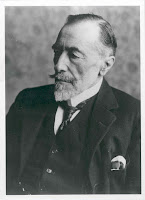
"And this also," said Marlow suddenly, "has been one of the dark places of the earth."
He was the only man of us who still "followed the sea." The worst that could be said of him was that he did not represent his class. He was a seaman, but he was a wanderer, too, while most seamen lead, if one may so express it, a sedentary life. Their minds are of the stay-at-home order, and their home is always with them--the ship; and so is their country--the sea.
Joseph Conrad's Heart of Darkness
B) And connected to the previous point, it is necessary to be wanderers, and not ones who are at home with their wandering. One's home is not the ship. The ship is a temporary place. The primary problem is (A) that people aren't wanderers--they are content, rather, with a sedentary life. The second problem is that when people wander, they wander as a vocation. The point of wandering is eventual rest.
Unity
 As a Coleridgian myself, it is hard for me to ever admit of a circumstance in which unity and coherence is not the highest goal. One must admit, however, that there might be a circumstance in which unity is not, in fact, the greatest good.
As a Coleridgian myself, it is hard for me to ever admit of a circumstance in which unity and coherence is not the highest goal. One must admit, however, that there might be a circumstance in which unity is not, in fact, the greatest good.

